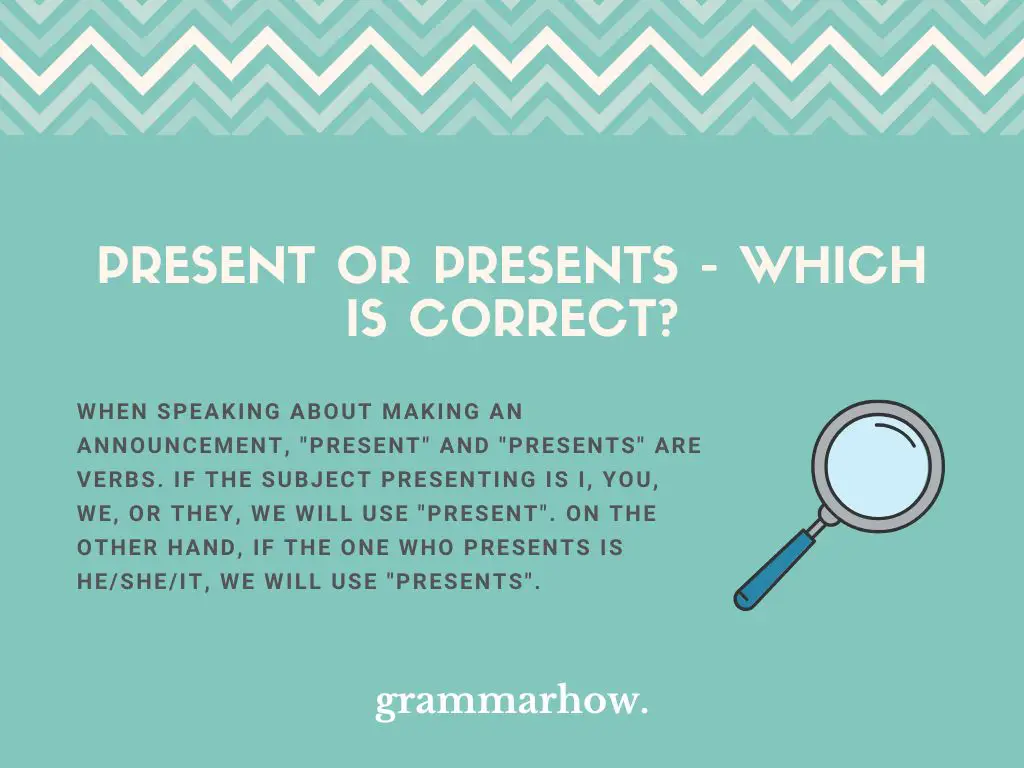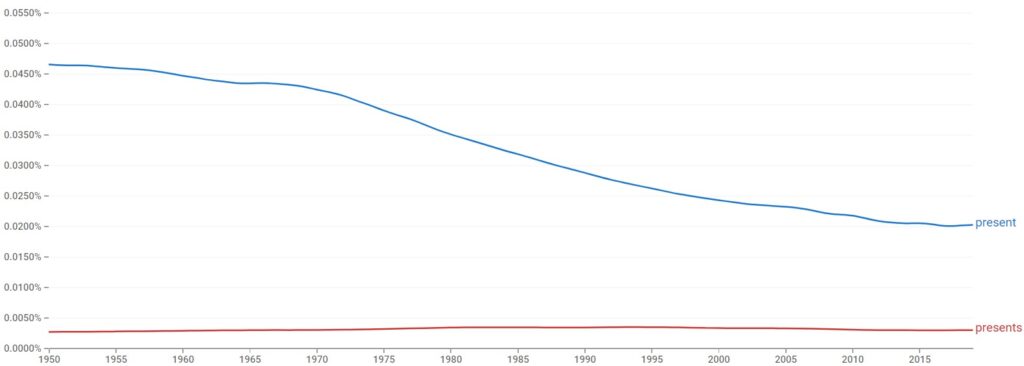“Present” and “presents” are two terms that, without a context, can mean a wide variety of things. However, which of the two should we use and when? The answer to that question depends on the context. Keep on reading because this article will teach you which to use and when.
Present or Presents – Which Is Correct?
When speaking about making an announcement, “present” and “presents” are verbs. If the subject presenting is I, you, we, or they, we will use “present”. On the other hand, if the one who presents is he/she/it, we will use “presents”.

These terms aren’t interchangeable and cannot be used as synonyms because they are different conjugations of the same verb.
“Present” is a word with a plethora of meanings. For example, as a noun, it refers to the current moment or period and tense, too. In addition, also as a noun, it refers to a gift.
But this is not all; this word can also be used as a verb. In this form, it means to bring someone into the presence of a person. It can also be used to come forward, appear in a particular place, or before a particular person. As a third meaning, we can use it to give a presentation to someone.
So, let’s summarize the correct conjugation of this verb:
- When the one presenting is I, you, we, or they, we will use “present”
- When the one presenting is he, we will use “presents”.
Present
Concerning an announcement, we will use “present” for the subjects I, you, we, and they in the present tense. However, this word can also be used as a noun; as such, it refers to a gift, or to a certain particular period.
Because “present” has many connotations, we checked The Cambridge Dictionary to shed some light on all its meanings. Their definition adds that it can be used as an adjective; as such, it will go before a noun to indicate existing at that time.
Let’s see some examples of how to use “present” in a sentence:
- Please send this telegram again to her present address.
- FOX and Miracle present Mike Donovan’s latest feature.
- I am so glad. I wasn’t expecting any present for my graduation.
- The Wichita Actors Association and Burlesque Theatre proudly present a modern adaptation of A Streetcar Named Desire.
- If it is so important to you, I can introduce you to the board so that you can present the problems related to logistics.
- This statement goes to all present: we lead by example.
- This is not just a present; it is a way to tell you how much I love you.
Presents
“Presents” is the way to conjugate the verb “to present” for the subjects he, she, and it. In this context, “presents” means to give, provide or make something known. Also, you can find it as the plural of “present” when used as a synonym for “gift”.
Let’s see now some examples of how to use “presents” in a sentence.
- The City of Memphis, in partnership with Greenpeace, proudly presents a suburban reforestation program that seeks to improve the life quality for citizens.
- When Mr. Bowman presents his project to the local authorities, a problem that involves all the actors of society will be visualized.
- Warner Brothers presents: “Warriors, tales of violence”, a film by Alex Bronson.
- He was so happy when he got so many presents for his birthday.
- Miss Liner presents her resignation to the magistrate to dedicate herself to taking care of her personal life.
- Presents are all kids care about at Christmas; haven’t you watched “Home Alone”?
Which Is Used the Most?
The Google Ngram Viewer graph for “present” and “presents” shows two uneven curves. On the one hand, “present” shows a drop in its curve of use from the second half of the 20th century, while “presents” shows a very modest usage in the same period. These relationships occur for both US and UK English.

Final Thoughts
“Present” and “presents”, used as verbs, are valid terms as long as they are conjugated correctly. If the presenter responds to the pronouns I, you, we, and they; we will use “present”. Instead, if it responds to he, she, or it, we will use “presents”.

Martin holds a Master’s degree in Finance and International Business. He has six years of experience in professional communication with clients, executives, and colleagues. Furthermore, he has teaching experience from Aarhus University. Martin has been featured as an expert in communication and teaching on Forbes and Shopify. Read more about Martin here.
